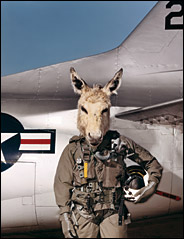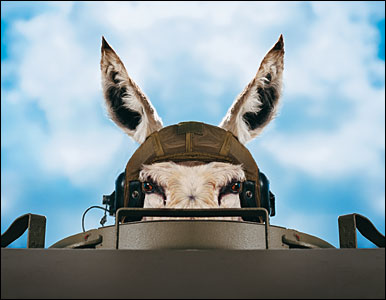DEMOCRATS AND WAR

A few weeks ago, I asked Howard Dean how, given his vehement opposition to the war in Iraq, he felt he could overcome the Democrats’ reputation as the antiwar party. ”I think you’re still in the old paradigm, which says that they’re the party of strength and we’re the party of weakness,” Dean admonished me as I sat across from him on his campaign plane. The chaos in Iraq, he said, had upended the old stereotypes. In John F. Kennedy’s day, Dean pointed out, the Democrats enjoyed the reputation as the party of resolution. ”I think this may be the year to regain it, oddly enough,” Dean said. ”Oddly enough” is right. It seems awfully unlikely that in the first presidential election since 9/11, against a president who has spent most of his administration carefully cultivating and reinforcing his role as commander in chief, the Democrats can regain the status as the party of national security, which they lost during the Vietnam War. But that is precisely what party strategists were hoping through the fall as American troops got caught in the mayhem of Iraq and the nation’s standing in the world plummeted lower and lower. And they had reason to think so. A poll conducted in November by the nonpartisan PIPA-Knowledge Networks found that 42 percent of Americans said that the president’s handling of Iraq decreased the likelihood of voting for him, versus 35 percent who said it had increased the likelihood. Another poll taken around the same time found that a majority of respondents believed that President Bush is ”too quick to use our military abroad” and that he practices a ”go-it-alone foreign policy that hurts our relations with allies.” Earlier, Democracy Corps, a Democratic polling and policy organization headed by the consultants James Carville and Robert Shrum and the pollster Stanley B. Greenberg, published a study with the following conclusion: ”When Democrats put out a clear message on national security, it now plays Bush’s post-9/11, post-Iraq message to a draw.”
Maybe. But this strikes me as more likely:
The Democrats seem trapped between two irreconcilable impulses, or litmus tests. This is especially obvious, and painful, with figures like John Kerry, who has tried to have it both ways. In the run-up to the war, Kerry harshly criticized President Bush for alienating our allies and then voted for the resolution authorizing war. Then he voted against the $87 billion appropriation, complaining that the president lacked a clear postwar plan. As Baghdad plunged into chaos and Dean worked his magic, Kerry began to sound more and more like an antiwar candidate. And then when Saddam Hussein was captured, Kerry criticized Dean for failing to acknowledge the full magnitude of the achievement. It’s no wonder that Chris Matthews tied Kerry into a pretzel when he pressed him on ”Hardball” to supply a ”yes or no answer” on Iraq.
You can imagine two very different solutions to the irreconcilable-litmus-test problem. If the capture of Saddam Hussein leads to a rapid improvement of conditions in Iraq, the Democratic litmus test could change, and the party could nominate a candidate who couldn’t be stereotyped as soft. And if, alternatively, conditions in Iraq fully disintegrate, the general election litmus test could change, and Howard Dean could prove to have been prescient. But there is a sizable body of opinion that argues that the Democrats cannot overcome their historic reputation with a candidate who opposed the war, or perhaps even opposed the $87 billion appropriation — no matter what his other views or his resume.
Michael O’Hanlon, a senior fellow at the Brookings Institution, has a nightmare in which Dean wins the nomination, conditions in Iraq improve modestly and in the course of a debate, President Bush says: ”Go to Iraq and see the mass graves. Have you been, Governor Dean?” In this nightmare, Bush has been, and Dean hasn’t. ”Saddam killed 300,000 people. He gassed many of these people. You mean I should have thought there were no chemical weapons in the hands of a guy who impeded our inspectors for 12 years and gassed his own people and the Iranians?” O’Hanlon glumly says that he has resigned himself to the thought that ”the Democratic base is probably going to lose the Democrats the election in 2004.”
Strong and wrong beats weak and right — that’s the bugbear the Democrats have to contend with. George McGovern may have had it right in 1972, but he won Massachusetts, and Richard Nixon won the other 49 states. McGovern recently said that he is a big fan of Howard Dean, whose campaign reminds him very much of his own. Dean may want to ask him to hold off on the endorsement.
Indeed. Or Michael Dukakis, for that matter.



Ha!
Michael O’Hanlon is either a moron or is being misquoted. Those mass graves were filled after Bush ’41 instigated a rebellion and promptly ignored it. And the gassing of his own people! Man, we can just use the U.S. Government’s own declassified records to show Rummy coddling Saddam while it was happening.
I mean, if the Right wants to win this election based on cute “gotcha” phrases that are completely devoid of any historic context, be my guest. But I tell ya, the lobotomy doesn’t seem to be worth the prize.
I doubt many Democrats are having reoccurring nightmares about such patently moronic attacks. More likely, it’s Republican’s reoccurring wet dream fantasies of fighting victorious battles of the past.
Keep dreaming Hal.
You guys wanted the mass murder to stay in power.
end of discussion.
We supported Saddam, or at least looked the other way, when he was fighting an enemy of the United States, the Ayatollah’s Iran. That’s hardly surprising; the world scene was a radically different place in 1984, with the Cold War on.
And the gotcha phrase is, after all, a reasonable response to Dean’s saying we shouldn’t have gone to war with Saddam and that we’re no more secure now than we were beforehand.
Until Democrats decide what they actually believe in without waiting to see how world events unfold or taking a poll, they’ll continue to look weak. Whether you believe Bush is right or wrong, he shows conviction and leadership, traits that are generally well respected, and traits that Democrats seem to lack.
How old are most of the “You supported him *then*” crowd? I suspect they did not spend their elementary school years under a desk or crouched in the hallway. Those were the days that created the phrase “…and kiss your ass good-bye.” We believed we were seconds away from cinders. There *is* a context.
Oooh. You’re so masterful Paul. “End of discussion” So creative.
Meezer, I’m 41. I was there and politically active during the whole ’80s. I *remember* the context.
Paul on the other hand, probably wasn’t even born then.
You miss my point.
If you think for a nanosecond that the fact we supported people who were against the Soviet Union and the Ayatollah 20 years ago is an election winner you are proving once again that you are delusional. People don’t care and if they do MOST of them (excluding you) are mature enough to understand that the world does indeed change.
My point is at the end of the day (November) it will be a case of one side wanted the mass murdering, child torturer to keep raping women and torturing children and one side wanted it to stop.
You and the rest of the Democrats are on the wrong side of history.
Hal,
It definitely was not at the same time and the start of those mass graves was look before bush 41. The US at that time was bent over a barrel with our “multi-lateral” patnership with the UN and most of the middle east. The Saudi’s at that time absolutely refused to “let” us go after Hussein. Why we bothered listening, who knows. It was important to the Pres and Congress at that time. Current intelligence at that time is that the republican guard was dealt a crippling blow and that a rebellion would work. I guess, more CIA folies.
As to the partnership with Rumsfeld, Iraq was giving most of the Meiddle east the heebie jeebies at that time. There was no one that could not say for sure whether this was not going to race throughout the middle east. BUT, aid to Iraq at that time was 41 helicopters, millions in food credits, and a vacination strain of anthrax because Iraq has a problem with that in their livestock. No real weapons and maybe they tried to weaponize the strain but that would have been hard. So you are barking at nothing.
Gee Paul, I didn’t say it was an election winner. If you actually read what I said, you’ll find that I think the moronic questions that James quoted O’Hanlon as having reoccurring nightmares about have effective counter attacks. It’s you that are deluded to think that such moronic attacks, backed up by bluster instead of actual facts or logic, will give Democrats the heeby jeebies.
Learn to argue Paul.
And Capt joe. You’re pretty naive as to what went down. Check out the facts over at the National Security Archives. It’s all documented with our own declassified documents, not some conspiracy theorist like the RWAP has connecting Saddam to 9/11.
Oh, and let’s not forget we were selling the Ayatollah weapons through our good friends Israel during the exact period you’re saying we were giving them the heeby jeebies.
I love it when my political opponents are simply ignorant and unable to comprehend more than a black and white fantasy world.
I think that there are lessons to be learned from the 1972 election. War was a huge issue and the Democrats were fuled by the energy of the anti-war movement. I was a student at UNH at the time and worked for Pete Mcclusky – an anti-war, anti-Nixon Republican. We were right – history has proved that. However, Nixon was able to take this issue off the table and win the election.(BTW I’m still mad about that;-) Anyway, my point is that this election can not be about any particular issue because issues come and go and can be manipulated. It can’t be about anger either because although we have much to be angry about that is an energy draining emotion and will not provide what me need to take this country back from the special interests and big money. I am in NH still and activly involved in a campaign for the first time since 1972. There is a candidate who has the right message, the right credentials and the positive vision. Can you guess who I am supporting? I’ll give you a hint yesterday he ended a speach saying “I beleive in you and isn’t it time you had a president who believes in you.”